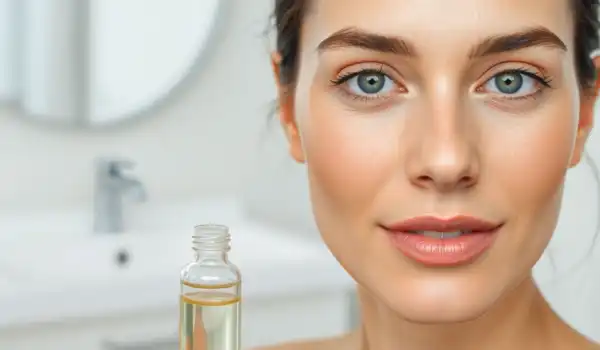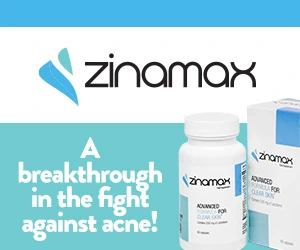Surprisingly, 100% of products for treating and preventing acne recommend oil cleansers. They help remove excess oil and impurities without drying out the skin. This makes oil cleansing a great natural remedy for acne. Many people with acne have seen big improvements in their skin after using oil cleansing.
Studies show oil cleansing is good for acne-prone skin. It cleanses gently without harsh chemicals. The right oils can balance the skin’s oil, reduce inflammation, and strengthen the skin barrier. This makes oil cleansing a top natural remedy for acne.

There are 12 expert-approved oil cleansers for acne, priced from $11 to $89. They often include jojoba oil, rose essential oil, and argan oil. These ingredients help control sebum, blackheads, and pores. With the right oil blend, oil cleansing can be a key part of your natural acne treatment routine.
Understanding the Oil Cleansing Method
The oil cleansing method uses oil to clean the skin. It removes excess oil and impurities without drying out the skin. This method is based on the idea that “like dissolves like,” allowing oil to effectively remove excess oil from the skin. It helps promote clear skin and reduce acne.
Oil cleansing is great for acne because it removes sebum and oil-based impurities without leaving a greasy feel. It’s gentle and works well for oily or acne-prone skin. It doesn’t irritate the skin or strip away too many oils, which can cause more oil to be produced. Common oils used for oil cleansing include castor oil, olive oil, sunflower oil, sweet almond oil, coconut oil, avocado oil, and grapeseed oil.
Choosing the right oil blend is key for clear skin. For oily skin, a mix of 1/3 castor oil or hazelnut oil with 2/3 sunflower, grapeseed, or sweet almond oil works well. Dry skin benefits from nourishing oils like avocado or olive oil, or a small amount of castor/hazelnut oil with nourishing oils. Finding the perfect oil blend can help achieve clear, healthy-looking skin.
The oil cleansing method has many benefits. It removes residual sunscreen, including waterproof types, and is gentle for oily or acne-prone skin. It also helps reduce inflammation and redness, leading to a more even-toned complexion. Adding oil cleansing to your skincare routine can lead to clear, healthy-looking skin.
Can Oil Cleansing Help with Acne? The Scientific Evidence
Oil cleansing for acne has become more popular. Science backs its effectiveness. Studies show it can cut down on acne by removing extra oil and dirt.
A 2018 study found that certain skin bacteria protect against acne. Oil cleansing helps keep these beneficial bacteria on the skin.
Oil cleansing offers several benefits for acne-prone skin. These include:
- Antioxidant properties that protect against inflammation
- Anti-inflammatory properties that reduce redness and swelling
- Ability to balance the skin’s natural moisture barrier, which can help reduce acne
Specific oils like olive, sunflower, and grapeseed oil are good for the skin. They have anti-inflammatory effects and protect against skin cancer. Oil cleansing is a natural remedy for acne. It’s essential to note that different oils benefit the skin differently. People with specific skin types or allergies should be careful.
The scientific evidence supports oil cleansing as a tool against acne. When used with other natural remedies, it can lead to healthier-looking skin.
The Benefits of Oil Cleansing for Acne-Prone Skin
Oil cleansing can help acne-prone skin in many ways. It balances the skin’s natural oils, reduces inflammation, and strengthens the skin barrier. Using the right oils can control oil production, preventing acne. It also makes the skin clearer by reducing redness and inflammation.
To start oil cleansing for acne, choose a gentle oil. Then, use a cream or foam cleanser for a second cleanse. This helps treat acne. Good oils for this include jojoba, grapeseed, and sunflower seed oil.
Here are some benefits of oil cleansing for acne-prone skin:
- Balances the skin’s natural oil production
- Reduces inflammation and redness
- Supports the skin barrier
- Effectively removes makeup and impurities without harsh scrubbing
- Moisturizes the skin, reducing dryness and irritation
Adding oil cleansing to your skincare routine can lead to clearer, healthier skin. It’s a great way to care for your skin.
| Oil Type | Benefits |
|---|---|
| Jojoba Oil | Balances skin’s natural oil production, reduces inflammation |
| Grapeseed Oil | Lightweight, non-greasy, and easily absorbed |
| Sunflower Seed Oil | Rich in antioxidants, helps to reduce inflammation |
Best Oils for Different Types of Acne
For oil cleansing for hormonal acne, some oils can help control oil production and lower inflammation. Jojoba oil is great for hormonal acne because it balances the skin’s oils. On the other hand, oil cleansing for cystic acne might benefit from tea tree oil. It has antibacterial properties that can fight acne.
Here are some top oils for different acne types:
- Jojoba oil: good for hormonal acne
- Tea tree oil: great for cystic acne
- Grap seed oil: rich in linoleic acid, good for oily and acne-prone skin
- Argan oil: hydrates and calms, helps fix the skin barrier
Choosing the right oil is key to clear skin and less acne. The right oil can balance your skin’s oil, reduce inflammation, and stop breakouts.
Step-by-Step Guide to Oil Cleansing
To start oil cleansing, you need to know the process and what you’ll need. It’s a method that uses oils to clean and nourish your skin. Choosing the right oils and sticking to a routine is key for clear skin.
The double cleansing method is popular. It uses two cleansers: one oil-based and one water-based. This method helps remove dirt and excess oil, leading to clearer skin and less acne.
Preparation and Materials Needed
Before you begin, wash your hands and face. Have a clean towel and oil cleanser ready. You can pick from oils like castor oil, olive oil, or avocado oil, based on your skin type.
The Double Cleansing Method
The double cleansing method starts with the oil-based cleanser. Then, you use the water-based cleanser. This combo cleanses and moisturizes your skin.
Frequency and Timing Recommendations
How often you oil cleanse depends on your skin. You might do it once or twice a day. Being consistent and patient is important, as oil cleansing takes time to work.
Here are some tips to keep in mind:
- Use a dime-sized amount of oil for each cleansing session
- Rinse your face with warm water and pat dry with a clean towel
- Use a gentle cloth to remove any remaining oil and impurities
By following these steps and tips, you can add oil cleansing to your skincare routine. Enjoy the benefits of clear, healthy skin.
| Oil Cleansing Method | Benefits |
|---|---|
| Double Cleansing | Removes excess oil and impurities, promotes clear skin |
| Single Cleansing | Nourishes and moisturizes the skin, reduces acne |
Treating Hormonal and Cystic Acne with Oil Cleansing
Oil cleansing is a good way to fight hormonal and cystic acne. It works by using the right oil for your skin and acne. This helps clear your skin and lessen acne.
For cystic acne, some oils have antibacterial properties. Tea tree oil, for example, fights bacteria that cause cystic breakouts.
Specific Approaches for Hormonal Acne
Hormonal acne is tough to treat, but oil cleansing is gentle and effective. Jojoba oil is great for hormonal acne. It balances your skin’s oil and reduces inflammation.
Managing Cystic Breakouts
Cystic acne needs a special approach. Oil cleansing can help manage breakouts. Oils like tea tree oil have antibacterial properties that fight acne-causing bacteria.
Oil cleansing for hormonal and cystic acne has many benefits. These include:
- Reduced inflammation and redness
- Improved skin balance and oil production
- Antibacterial properties to combat acne-causing bacteria
Adding oil cleansing to your skincare routine helps manage hormonal and cystic acne. Choose the right oil for your skin and acne. Always patch test a new oil before using it.
| Oil Type | Benefits |
|---|---|
| Jojoba Oil | Regulates skin’s natural oil production, reduces inflammation |
| Tea Tree Oil | Antibacterial properties, reduces acne-causing bacteria |
Common Mistakes to Avoid During Oil Cleansing
Oil cleansing can be tricky if you don’t know what to avoid. One big mistake is picking the wrong oil for your skin. This can cause clogged pores and breakouts. So, it’s key to choose an oil that matches your skin type and needs.
Another error is not washing your skin well after oil cleansing. This can leave oil residue that clogs pores and leads to breakouts. To do oil cleansing for acne right, make sure to rinse your skin well with warm water. Then, gently pat it dry with a clean towel.
Here are some more tips to remember:
- Apply oil cleanser to dry skin, not damp skin
- Massage the oil cleanser into your skin for at least 60 seconds
- Rinse your skin well with warm water
- Stay away from oils that can clog pores
By avoiding these common oil cleansing mistakes, you can help your skin stay clear and reduce acne. Be patient and stick to your oil cleansing routine. It might take some time to see the results you want.
What to Expect: Timeline and Results
Starting an oil cleansing routine means knowing what to expect. It can cause a skin purge for some, lasting 2 weeks to a month. This might make your skin look worse before it gets better, but it’s a normal step.
After the purge, oil cleansing can offer many benefits. You might see clearer skin, less acne, and a better skin barrier. To get these benefits, be patient and stick to the routine. Results can vary, but many people see their skin health improve and acne decrease with regular use.
- Be gentle with your skin and avoid over-exfoliating
- Choose the right oil for your skin type, whether oily, dry, or combination
- Combine oil cleansing with other skincare steps like moisturizing and sun protection
By following these tips and staying consistent, you can enjoy all the benefits of oil cleansing. You’ll get healthier, more balanced skin over time.
Conclusion: Is Oil Cleansing Right for Your Acne?
The oil cleansing method can be gentle and effective for acne-prone skin. Using non-comedogenic oils like jojoba, rosehip, or grapeseed helps cleanse your skin. It also keeps your skin’s natural balance and supports the skin barrier. But, how well it works depends on your skin type and how it reacts.
Some studies suggest it’s promising, but more research is needed on its long-term effects. Always talk to a dermatologist to find the best skin care for you. With time, trying different things, and being open to change, oil cleansing can help manage your acne.
FAQ
Can oil cleansing help with acne?
Yes, oil cleansing is a gentle way to treat acne. It removes excess oil and impurities without drying out the skin. This helps reduce acne and promotes clear skin.
What is the science behind oil cleansing?
Oil cleansing works because “like dissolves like.” This means oil can remove excess oil and impurities from the skin. It helps clear the skin and reduce acne.
How does oil cleansing differ from traditional cleansing methods?
Traditional cleansing often uses harsh ingredients that dry out the skin. Oil cleansing, on the other hand, uses oil to remove excess oil and impurities without drying out the skin.
What are the benefits of oil cleansing for acne-prone skin?
Oil cleansing balances the skin’s natural oil production, reduces inflammation, and supports the skin barrier. It helps regulate oil production, which can reduce acne.
What types of oils are best for different types of acne?
Different acne types need different oils. For example, hormonal acne may benefit from jojoba oil, while cystic acne may benefit from tea tree oil. Choosing the right oil can help clear the skin and reduce acne.
How do I get started with oil cleansing?
To start oil cleansing, prepare your skin and materials. Wash your hands and face, and have a clean towel and oil cleanser ready. Use the double cleansing method with an oil-based and water-based cleanser.
What are common mistakes to avoid during oil cleansing?
Avoid using the wrong oil for your skin type and not rinsing well. These mistakes can lead to clogged pores and acne. By avoiding them, you can achieve clear skin.
What can I expect when starting an oil cleansing routine?
Starting oil cleansing may cause an initial purging period where your skin looks worse before it gets better. This is normal. Be patient and consistent. Oil cleansing can lead to clear skin, reduced acne, and a balanced skin barrier in the long run.


